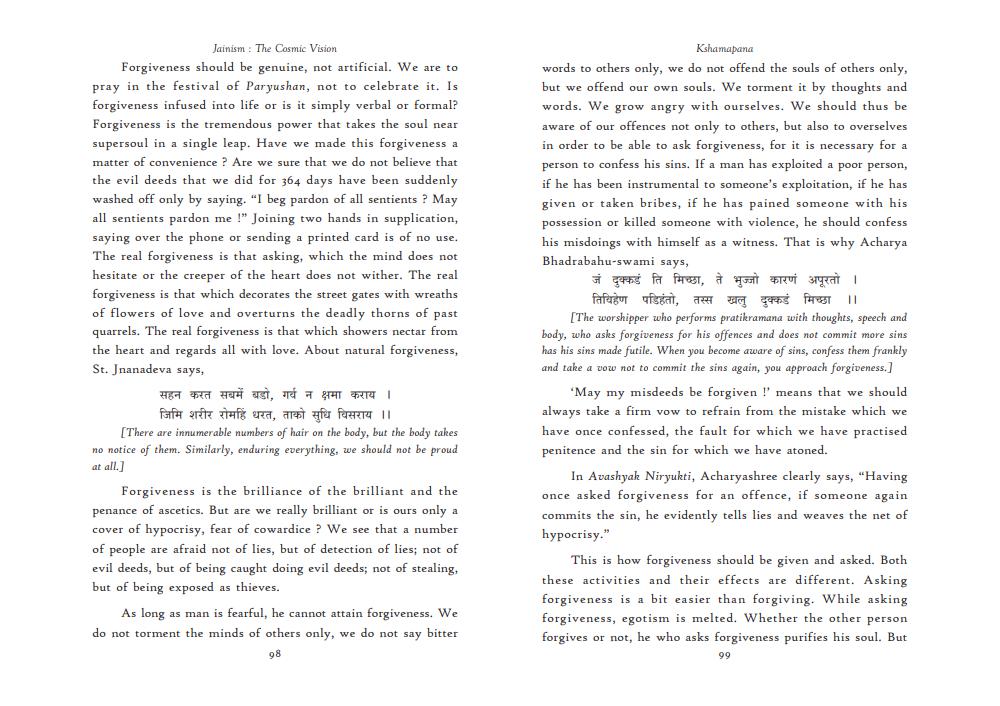________________
Jainism: The Cosmic Vision
Forgiveness should be genuine, not artificial. We are to pray in the festival of Paryushan, not to celebrate it. Is forgiveness infused into life or is it simply verbal or formal? Forgiveness is the tremendous power that takes the soul near supersoul in a single leap. Have we made this forgiveness a matter of convenience? Are we sure that we do not believe that the evil deeds that we did for 364 days have been suddenly washed off only by saying. "I beg pardon of all sentients? May all sentients pardon me !" Joining two hands in supplication, saying over the phone or sending a printed card is of no use. The real forgiveness is that asking, which the mind does not hesitate or the creeper of the heart does not wither. The real forgiveness is that which decorates the street gates with wreaths of flowers of love and overturns the deadly thorns of past quarrels. The real forgiveness is that which showers nectar from the heart and regards all with love. About natural forgiveness, St. Jnanadeva says,
सहन करत सबमें बडो जिमि शरीर रोमहिं धरत
गर्व न क्षमा कराय । ताको सुधि विसराय ।।
[There are innumerable numbers of hair on the body, but the body takes no notice of them. Similarly, enduring everything, we should not be proud at all.]
Forgiveness is the brilliance of the brilliant and the penance of ascetics. But are we really brilliant or is ours only a cover of hypocrisy, fear of cowardice? We see that a number of people are afraid not of lies, but of detection of lies; not of evil deeds, but of being caught doing evil deeds; not of stealing, but of being exposed as thieves.
As long as man is fearful, he cannot attain forgiveness. We do not torment the minds of others only, we do not say bitter 98
Kshamapana
words to others only, we do not offend the souls of others only, but we offend our own souls. We torment it by thoughts and words. We grow angry with ourselves. We should thus be aware of our offences not only to others, but also to overselves in order to be able to ask forgiveness, for it is necessary for a person to confess his sins. If a man has exploited a poor person, if he has been instrumental to someone's exploitation, if he has given or taken bribes, if he has pained someone with his possession or killed someone with violence, he should confess his misdoings with himself as a witness. That is why Acharya Bhadrabahu-swami says,
जं दुक्कडं ति मिच्छा, ते भुज्जो कारणं अपूरतों ।
तिथिहेण पडिहंतो, तस्स खलु दुक्कडं मिच्छा ||
[The worshipper who performs pratikramana with thoughts, speech and body, who asks forgiveness for his offences and does not commit more sins has his sins made futile. When you become aware of sins, confess them frankly and take a vow not to commit the sins again, you approach forgiveness.]
'May my misdeeds be forgiven!' means that we should always take a firm vow to refrain from the mistake which we have once confessed, the fault for which we have practised penitence and the sin for which we have atoned.
In Avashyak Niryukti, Acharyashree clearly says, "Having once asked forgiveness for an offence, if someone again commits the sin, he evidently tells lies and weaves the net of hypocrisy."
This is how forgiveness should be given and asked. Both these activities and their effects are different. Asking forgiveness is a bit easier than forgiving. While asking forgiveness, egotism is melted. Whether the other person forgives or not, he who asks forgiveness purifies his soul. But
99




